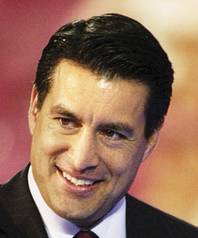Sunday, Feb. 27, 2011 | 2 a.m.

Brian Sandoval
Sun coverage
Sun archives
- Democrats say Sandoval budget has $325 million hole (2-24-2011)
- UNLV president’s somber warning on budget cuts moves faculty to tears (2-16-2011)
- Regent says it’s time that K-12 shares in budget sacrifice (2-8-2011)
- Higher education officials say Sandoval budget cuts a ‘death sentence’ (2-4-2011)
- Education in forefront of upcoming budget battle (1-30-2011)
- Chancellor: University tuition would have to go up 73 percent to cover Sandoval budget gap (1-27-2011)
- School officials warn of jobs cuts, larger classes under proposed budget (1-26-2011)
- A steep climb for Nevadans (1-26-2011)
- Soft words during State of the State hide Nevada in pain (1-25-2011)
- Teachers not pleased with most of Sandoval’s speech (1-25-2011)
- In response, Democrats say taxes might be part of budget solution (1-24-2011)
The debate over Gov. Brian Sandoval’s proposed education funding cuts has put the spotlight on Clark County’s capital projects fund and the billions of dollars it has raised and spent since 1998. Sandoval’s budget would use $425 million from the fund to staff classrooms, not build them.
Such a move would translate into fewer cuts in education operating budgets. But, according to Democrats and their allies in the education community, it would also defy voters who specifically approved using property tax for school construction.
The Sandoval administration has countered by noting that the fund is being used in ways voters wouldn’t have imagined when they cast their ballots. Its argument: The “school construction fund” has evolved into the school repair, maintenance and technology-upgrade fund.
Ballot Question 2 promised to extend property taxes that were scheduled to expire and allow the Clark County School District to “finance new school construction and the expansion and improvement of existing schools” for 10 years. Voters passed it overwhelmingly — 61 percent to 39 percent.
Now, after spending $4.9 billion, the property tax rate remains the same but the spending has switched from building classrooms during boom times to improving those buildings — repaving parking lots, replacing furniture, buying computers and upgrading Internet networks, as well as basic maintenance.
In the upcoming year, the district is planning to spend $74 million buying land despite flat growth since the Great Recession.
Sandoval’s budget asks: What would the public rather have, more land or fewer teacher layoffs?
Democrats last week criticized the administration, saying the plan is based on faulty assumptions — statewide there’s about $99 million available, not $425 million.
Regardless, the debate affords voters an opportunity to assess how the money was spent against the School District’s promises.
• The promise: Raise $3.5 billion for “school construction, two regional school bus yards and improvement of existing schools over the next 10 years.”
The reality: $4.9 billion was raised because land values increased more than projected.
(The Legislature allowed the district to buy things such as computer and technology upgrades, said Jeff Weiler, district chief financial officer.)
• The promise: Build 88 elementary, middle and high schools and provide $854 million for “rehabilitation, modernization and equipage of 235 existing schools.”
The reality: 101 schools, plus 11 replacement schools were built. The money has been used for $1.2 billion in rehabilitation and modernization, Weiler said.
• The promise: The district would not issue bonds after June 30, 2008.
The reality: The district can’t sell bonds now, but the property tax isn’t going down because money is needed to pay off principal and interest on the bonds that have been sold, Weiler said.
The district planned to ask voters in 2008 for an extension of the tax, but scrapped that idea with the sour economy and lower growth projections.
Still, School Board President Carolyn Edwards said the district has identified $4.9 billion in upgrades and projects over the next 10 years. And although district officials discussed “leaky roofs” in legislative committee hearings last week, much of the money to be spent over the next year will be used for technology.
Take next fiscal year’s capital project budget, which rises to $421 million from $275 million this year. It includes $15 million for a parking lot replacement at Western High School, $42 million for a bus depot and $15 million for furniture and equipment.
Billy Vassiliadis, a lobbyist who ran the 1998 campaign for Question 2, said the expanded uses are acceptable.
“Those things that improve and support the structure of learning would seem to be … fair to spend money on,” Vassiliadis said. “Wi-Fi was not contemplated in 1998 but today I’d submit it’s a fundamental need.”
But with public money tight and Nevada’s historically anti-tax sentiment, any spending is going to be scrutinized. That will be particularly true as Sandoval and lawmakers fight over education spending.

Join the Discussion:
Check this out for a full explanation of our conversion to the LiveFyre commenting system and instructions on how to sign up for an account.
Full comments policy